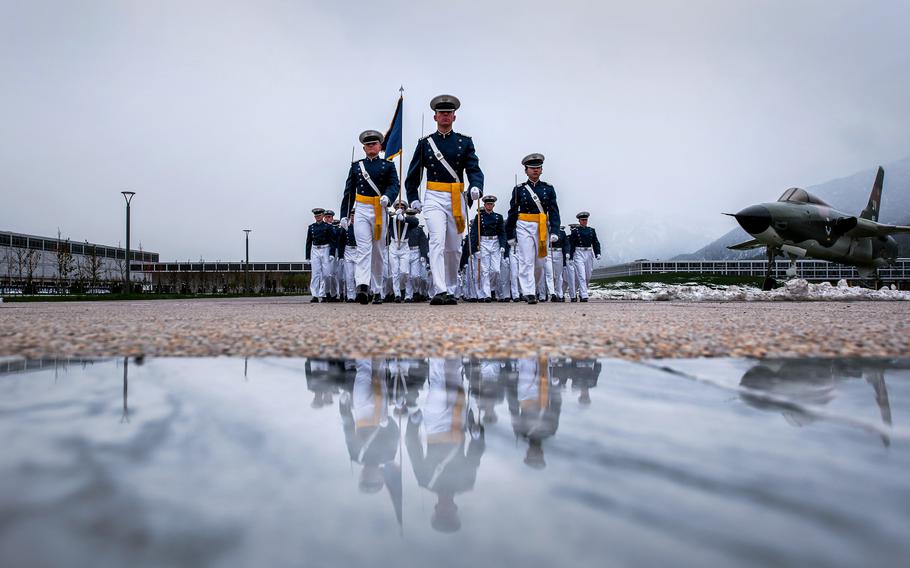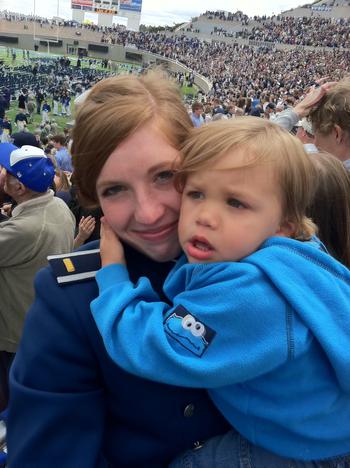
Air Force Academy cadets march on the Terrazzo on their way to Stillman Field during the graduation parade for the class of 2022 on May 24, 2022, in Colorado Springs, Colo. (Trevor Cokley/U.S. Air Force )
Four cadets at the Air Force Academy were allowed to continue their studies during the last year after having children due to a policy change enacted by Congress, according to academy officials.
Prior to lawmakers approving the change in 2021, the cadets would not have been permitted to have children and could have been forced to leave school.
The change impacts all three of the Defense Department’s service academies, though officials for the U.S. Military Academy at West Point, N.Y, and the Naval Academy in Annapolis, Md., said they are waiting for the Pentagon to issue a new formal policy, which was mandated by Congress to be implemented by January.
A spokesperson at the Pentagon said Friday that the new policy is still pending and declined to comment further.
The previous rule forced some cadets who became pregnant or sired a child to withdraw from the academies — a move that could cost tens of thousands of dollars because students who quit after the start of their third year can be required to repay the government. One year at a service academy costs roughly $82,000, according to a 2019 Defense Department memo.
The other options left for expecting students to stay in school included giving up custody of the child or terminating the pregnancy. It’s unclear how many students have been impacted by the policy because women don’t have to disclose abortions and men could become a father without telling the school.
“Understanding the intent of Congress, we worked with [Department of the Air Force] and DOD to implement a process in which cadets with natural-born children could remain at [the Air Force Academy] as long as they had an approved family care plan,” said Dean Miller, spokesman for the academy. “The details of the family care plan include who will care for the child financially and physically while the cadet remains enrolled at the academy."
Under the policy change, a cadet can now grant temporary guardianship of his or her child to another person while the cadet finishes his or her studies at the academy. A student would have to create a family care plan like ones that active-duty service members with children are required to produce.
Women can take up to two years away from their studies to give birth under the new law.
However, it doesn’t allow people who already have children to apply to service academies and still forbids cadets and midshipmen from getting married.
The change was introduced by Sens. Ted Cruz, R-Texas, and Kirsten Gillibrand, D-N.Y., in the Candidates Afforded Dignity, Equality and Training Act, or CADET Act, which was passed as part of the 2022 National Defense Authorization Act, an annual bill that outlines defense priorities and spending. The initial CADET Act legislation from Cruz and Gillibrand proposed pregnant women also be relieved from any service or financial obligations if they chose to withdraw from college. But that did not make it into the law.
The NDAA gave the Defense Department one year from the law’s signing on Dec. 27, 2021, to make the changes.
Air Force Reserve Maj. Melissa Hemphill said she began speaking out against the old policy in 2011 by writing the service secretary during her senior year at the Air Force Academy in Colorado Springs, Colo. Her senior year was delayed because she gave birth to her son Oliver.

Melissa Hemphill with her son Oliver at her graduation from the Air Force Academy in 2011. To stay at school, Hemphill had to delay her senior year, terminate custody of Oliver and then regain it after graduation. Now a major in the Air Force Reserve, she has since advocated for service academies to change the policy that bans students from having children. The policy was changed in 2021. (Photo provided by Melissa Hemphill)
Her boyfriend Anthony Hemphill, who was also a cadet and is now her husband and an Air Force major, finished his senior year, and then took custody of their child.
To go back and finish her final year, Hemphill had to go before a judge and relinquish custody of Oliver. The process cost about $11,000 in legal fees and took an emotional toll on her.
“There were people coming out of the woodwork to tell me they had children who they were hiding, or they had one or two or three abortions,” Hemphill said. “It was really devastating to families and also it was affecting a lot more people than we thought.”
Christian Paasch, an Air Force Academy alumnus and chairman of the National Parents Organization in Virginia, said he supported the policy change because it allows for a more humane process, not just for the students, but also for the children involved.
“What is the best thing for the children? Because what's best for children is best for society every single time,” he said. “You are increasing the likelihood that this child will have both parents in his or her life. We know that is what's best for children. Children benefit from that in every kind of measurable statistic.”
The policy change does not offer any benefits, such as additional pay or health insurance for children of academy students. However, the Pentagon anticipates it could be asked to do so in the future, according to a closed briefing that Defense Department officials presented last month to members of Congress. Stars and Stripes obtained a copy of the Pentagon’s presentation documents.
To help those students who find themselves pregnant or a soon-to-be parent, Hemphill and two other service academy alumni formed the nonprofit Military Academy Pregnancy Support. The group helps students navigate an unexpected pregnancy by helping with housing expenses, access to counseling services, funding travel to visit their child and newborn support.
In the last year, Hemphill said they’ve helped six Air Force cadets.
“I lived through being a cadet and having a family at the same time and I would never, ever recommend someone do it,” she said. "But at the same time, we can't wish away unexpected pregnancy because it's going to happen. It has been happening and it does happen.”
There also are questions about whether the students should continue to receive health insurance while they are on administrative leave to have a baby. A Defense Department group was developed to implement the initial change and present additional changes that the Pentagon should consider, according to the briefing documents.
Hemphill said she would like to see some of these questions addressed because not all students have the resources and support to take a year off from school to have a baby.
“You can have all the options, but if an option isn’t realistic … it’s like your choice is made for you,” she said. “We're trying to keep all the choices on the table. Especially when it comes to keeping the child and to be able to support that because that's a hard choice.”